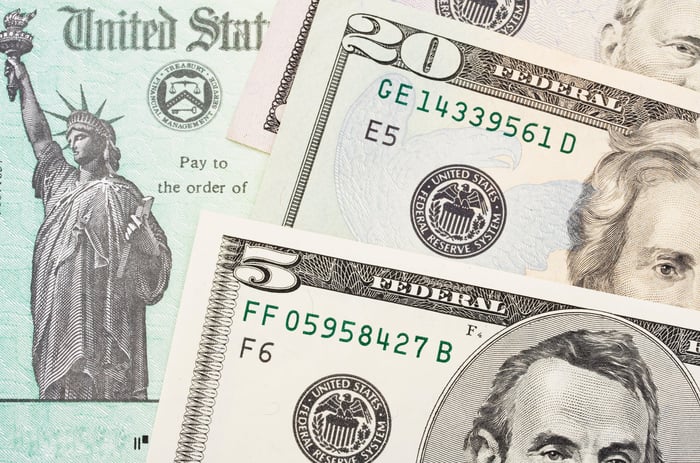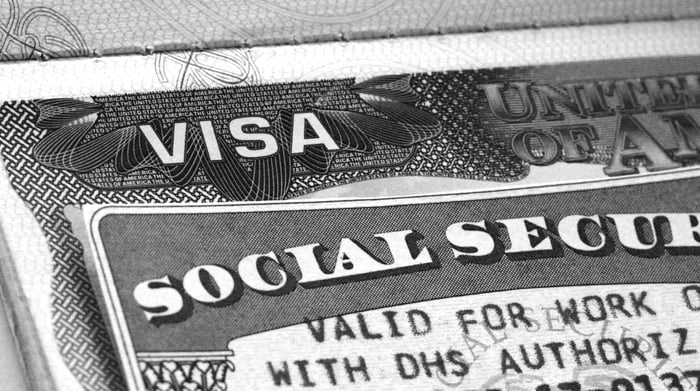It's been 22 days since the House of Representative passed, and President Trump signed into law, the largest stimulus bill in U.S. history. The Coronavirus Aid, Relief, and Economic Security (CARES) Act totals a whopping $2.2 trillion in aid and is a direct response to the record-breaking economic and labor-market turmoil caused by the coronavirus disease 2019 (COVID-19).
While there are numerous provisions contained within the CARES Act to prop up an ailing economy -- including $500 billion in loans to distressed industries, $350 billion in small business loans, and even $260 billion to bolster the unemployment program -- it's the $300 billion set aside from direct stimulus payments to working Americans and seniors that's garnered most of the attention.

Image source: Getty Images.
According to estimates, somewhere in the neighborhood of 140 million American households will receive an Economic Impact Payment -- or as most folks know it, a "stimulus check." The most money single filers and married couples filing jointly can hope to receive is $1,200 and $2,400, respectively, with stimulus recipients potentially netting an additional $500 per qualifying child aged 16 and under.
But at the other end of the spectrum are millions of Americans who won't receive a dime from this $2.2 trillion coronavirus relief package. Here are five groups of people who are unlikely to see any stimulus payouts.
1. High-income earners
The first group of people who won't be receiving a stimulus check are those who make too much money. As outlined by the CARES Act, single taxpayers making more than $99,000 in adjusted gross income (AGI), married couples filing jointly with over $198,000 in AGI, and head-of-household filers surpassing $136,500 in AGI aren't eligible for an Economic Impact Payment.
However, there's a bit of a catch to this rule. The Internal Revenue Service (IRS) is determining stimulus check eligibility by an individual's or couple's most recent tax filing. If, say, you made $70,000 in AGI as a single filer in 2018 but made $125,000 in AGI in 2019, you could choose to delay your 2019 tax year filing until July 15, 2020. (Tax Day was pushed back three months due to the coronavirus pandemic.) Doing so would allow your 2018 tax year to dictate your eligibility, thus netting you a $1,200 stimulus check. This catch won't apply to very many upper-income folks, but it is a possibility.

Image source: Getty Images.
2. Dependents aged 17 and up
Another broad group of people excluded from the stimulus payouts are dependents aged 17 and over. While dependent children aged 16 and under can net their parent(s) a payment of $500 per child, high school juniors and seniors, college-age dependents through the age of 24, and senior dependents, won't be eligible for a payout.

Image source: Getty Images.
3. Most non-citizens
According to data from the U.S. Census Bureau's American Community Survey between 2008 and 2018 via the Kaiser Family Foundation, there are about 21.7 million non-citizens living in the United States, of which between 16 million and 17 million are most likely adults aged 18 and older. For many of these non-citizens who don't have a valid Social Security number, no stimulus payout awaits. This also excludes undocumented immigrants from receiving a $500 payout per child, assuming their children aged 16 and under are American citizens.
The exception to the rule is green-card holders. These people, who have a legal pathway to permanent residence in the United States, are likely to receive an Economic Impact Payment.

Image source: Getty Images.
4. Those who are behind on child support payments
Are you in arrears on your student loan debt or owe the federal government for back taxes? Amazingly, that's not going to stop you from receiving a coronavirus stimulus check. However, if you're in arrears on your child support payments, then the Treasury Department is within its right to withhold some or all of your stimulus payout to help offset your child support obligations.
As with the other categories up to this point, there's a catch -- which is that individual states have to share information with the Treasury Department about the people who are behind on their child support payments. If a state fails to report collections owed to the Treasury Department, we could see instances where people in arrears on child support payments receive a stimulus check in one state, while people with overdue child support payments in other states fail to receive a dime.

Image source: Getty Images.
5. People who owe money to their bank
Lastly -- and I fully admit this is a pretty broad-spanning and somewhat vague umbrella -- people who owe their bank money may not see any of their stimulus payment. There's specific language in the CARES Act that prohibits federal and state debt collectors from seizing Economic Impact Payments to cover outstanding debts, but banks, which are private debt collectors, aren't guided by those same rules. Since the stimulus check is a tax credit and not a federal benefit, it gives banks the right to utilize this money the moment it's deposited into your account to satisfy what you owe.
What might banks use your stimulus check to cover? In theory, anything. Everything from overdraft fees to an outstanding loan is fair game for your bank to utilize your stimulus payout to offset what you owe.
The big question is whether or not banks will actually use this tactic to offset consumer debts. Among big banks, only JPMorgan Chase and Wells Fargo have thus far stated that they would not use stimulus payments to offset customer debts. This likely casts doubt among the tens of millions of folks who don't bank with JPMorgan Chase or Wells Fargo.




